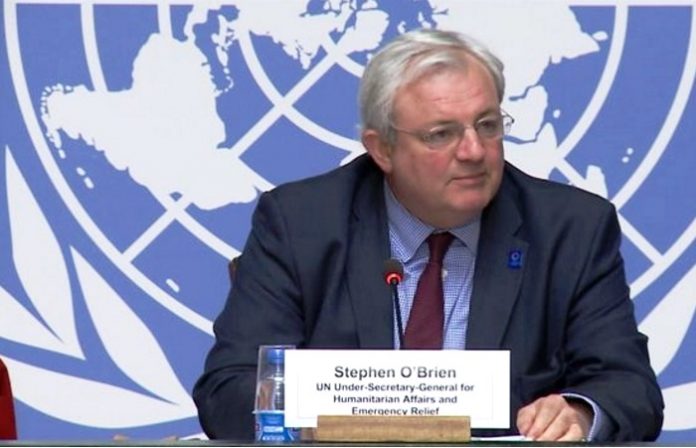
UN Emergency Relief Coordinator Stephen O’Brien said that the El Nino weather phenomenon has already affected 60 million people worldwide, warning that the worst impact from droughts is to come.
During a press conference in Geneva he said “some 60 million people across Eastern and Southern Africa, Central America, the Caribbean, Asia and the Pacific, they are trying to survive tonight, but they have draught, they have floods, they have erratic weather events all linked to El Nino and to exacerbated by the climate change.”
He added “we made a calculation that we have something of 3,6 billion dollars that needs to be appealed for to tackle El Nino related needs, that covers 13 countries, some of the countries haven’t yet finalised their full response plan so that number could go up.”
The funding gap for the combined global El Nino-related response stands at over (USD) $ 2.2 billion.
The current El Nino is one of the strongest on record. Its impact – inducing droughts- is expected to peak in late 2016 and early 2017. The situation could even become worse if a La Nina event — a cooling of the water in the equatorial Pacific which often follows an El Nino – strikes towards the end of this year.
O’Brien also warned about the disastrous effects of El Nino on already vulnerable communities.
He said “today, collectively we face a funding gap of over 2,2 billion dollars to provide food, clean water, basic medicine and seeds and that is to make sure that farmers don’t lose their next harvest. You will appreciate that not only they have lost this, but so often the seeds have been used to feed their own communities plus those who have had to come into their communities from areas which have got even less”.
According to Izumi Nakamitsu, UN Assistant Secretary-General and UNDP Assistant Administrator, it is critical to invest now to help ensure vulnerable communities can cope better with the next El Nino or other crises.
She said “our approach aims to support governments and also communities to have better in-country, in-community capacity to analyse the risks and respond better to the ongoing El Nino crisis to help them so that their response is appropriate and coordinated and also, as Stephen mentioned, well resourced, a critical point.”
Dr. Wolfgang Jamann, Care International Secretary General and CEO, said “we are at a tipping point, we are at the point where we try to prevent the loss of life, we are also at the point where the investment in preventing the situation to deteriorate actually will be another kind of good calculation, because what is happening now, the malnutrition, the malnourishment of children and vulnerable people, if we deal with it now, it will cost much less than if we deal with it on the long run. The long-term effects and consequences of malnourishment and its treatment will cost three times as much as to deal with it immediately.”

